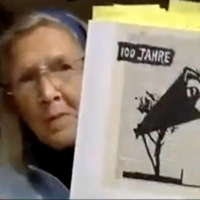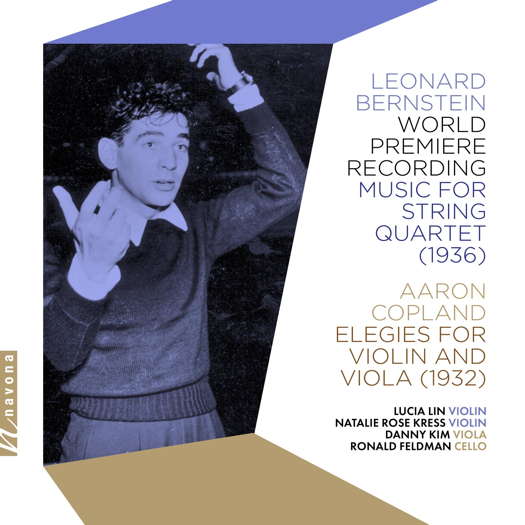- Goldoni
- Dave Griffiths
- Basil Ramsey
- baryton music
- Gerard Mortier
- Robert McCarney
- Rakhmaninov
- National Symphony Orchestra of Chile
 DISCUSSION: John Dante Prevedini leads a discussion about Music and the Visual World, including contributions from Celia Craig, Halida Dinova and Yekaterina Lebedeva.
DISCUSSION: John Dante Prevedini leads a discussion about Music and the Visual World, including contributions from Celia Craig, Halida Dinova and Yekaterina Lebedeva.
 VIDEO PODCAST: Discussion about Bernard Haitink (1929-2021), Salzburg, Roger Doyle's Finnegans Wake Project, the English Symphony Orchestra, the Chopin Competition Warsaw, Los Angeles Opera and other subjects.
VIDEO PODCAST: Discussion about Bernard Haitink (1929-2021), Salzburg, Roger Doyle's Finnegans Wake Project, the English Symphony Orchestra, the Chopin Competition Warsaw, Los Angeles Opera and other subjects.

A Bernstein No One Has Heard
JOHN DANTE PREVEDINI is impressed by a new release of early chamber music by Bernstein and Copland
'... thoughtfully curated and meticulously executed.'
Bernstein, Music for String Quartet (1936) is the upcoming release from Navona Records featuring the eponymous composition by Leonard Bernstein in its premiere recording, performed by Lucia Lin, Natalie Rose Kress, Danny Kim and Ronald Feldman. Composed while Bernstein was an eighteen-year-old student at Harvard University, the piece was subsequently lost and only recently rediscovered. This release pairs the newly unearthed quartet with Elegies for Violin and Viola (1932) by Bernstein's lifelong friend and collaborator, the fellow American composer Aaron Copland. The sixteen-minute EP is available in both CD and digital format and features an online booklet with extensive liner notes by former Boston Symphony Orchestra librarian John Perkel, who oversaw the process of finally bringing Bernstein's lost composition to life.
Music for String Quartet is a two-movement work spanning about ten minutes in total. Movement one, 'Allegro Vivace', begins with a pulsating ostinato outlining stacked fourth intervals, a motif which will reoccur throughout the seven-minute movement. Around this motif gradually emerges a complex and energetic interweaving of melodic and rhythmic content featuring expanded diatonicism and syncopation. Many of Bernstein's future trademark compositional techniques are already present here, including percussive gestures, melodies voiced in thirds and diverse harmonic influences from the rich variety of musical cultures that informed his upbringing. The harmonically unpredictable soundscape concludes humorously with a tonal resolution on a single pizzicato note.
Listen — Bernstein: Allegro Vivace (Music for String Quartet)
(NV6557 track 1, 0:00-0:30) ℗ 2023 Navona Records LLC :
Movement two, 'Andante (Tempo di Sarabande)', provides a significant contrast with the opening movement, showcasing the young Bernstein's lyrical and contrapuntal side. Individual voices outline diatonic legato lines which, when woven together, yield careful moments of chromatic dissonance. This short movement has a clear and balanced arch-form structure from the standpoint of register and dynamics, finally concluding with a sudden shift to a staccato gesture which somehow manages to create an effect both conclusive and unresolved.
Listen — Bernstein: Andante (Tempo di Sarabande) (Music for String Quartet)
(NV6557 track 2, 0:00-0:30) ℗ 2023 Navona Records LLC :
Following these two movements of the Bernstein quartet is the single-movement Elegies by Copland, a slow and lyrical composition of six minutes that alternates between polyphonic and chordal textures and gradually reveals a dramatic arc through a range of dynamics, silent pauses and percussive pizzicato passages. The harmony mostly employs free diatonicism with frequent arpeggiations of triads and open fourths, a sound world that will likely be recognizable to followers of the composer's best known works. Understandably, given Copland's early and lasting influence in the United States, this combination of harmonic traits still tends to be identified as 'Copland-esque' by American audiences when heard in other contexts, even in the music of much later composers with little or no connection to Copland himself. In any case, in Elegies it proves to be a very flexible idiom for contrapuntal invention and melodic development.
Listen — Copland: Elegies for Violin and Viola
(NV6557 track 3, 0:00-0:30) ℗ 2023 Navona Records LLC :
Much attention has been paid to Bernstein and his legacy in recent years, owing partly to the festivities surrounding his 2018 centennial as well as the anticipation of the upcoming film dramatization of his life, Maestro. Yet all of the attention is arguably well earned, as there has been perhaps no other figure who has single-handedly impacted classical music life in the United States so deeply on such a wide variety of fronts. This includes not only his composing and conducting but also his work as a music educator and commentator. As a result, this release will likely be of great interest to anyone thirsting to glimpse Bernstein at the moment his unique compositional voice began to form. Indeed, there is a remarkable sense of confidence, depth and originality in this music that is already identifiably his own. Furthermore, the inclusion of Copland's Elegies allows listeners to put Bernstein's youthful quartet in historical context and to hear how the two composers were dealing with similar creative challenges at a surprisingly early point in time. In conclusion, this release is a remarkable act of scholarship that resurrects a seminal moment in the history of American classical music, thoughtfully curated and meticulously executed.
Copyright © 29 August 2023
John Dante Prevedini,
Connecticut, USA



